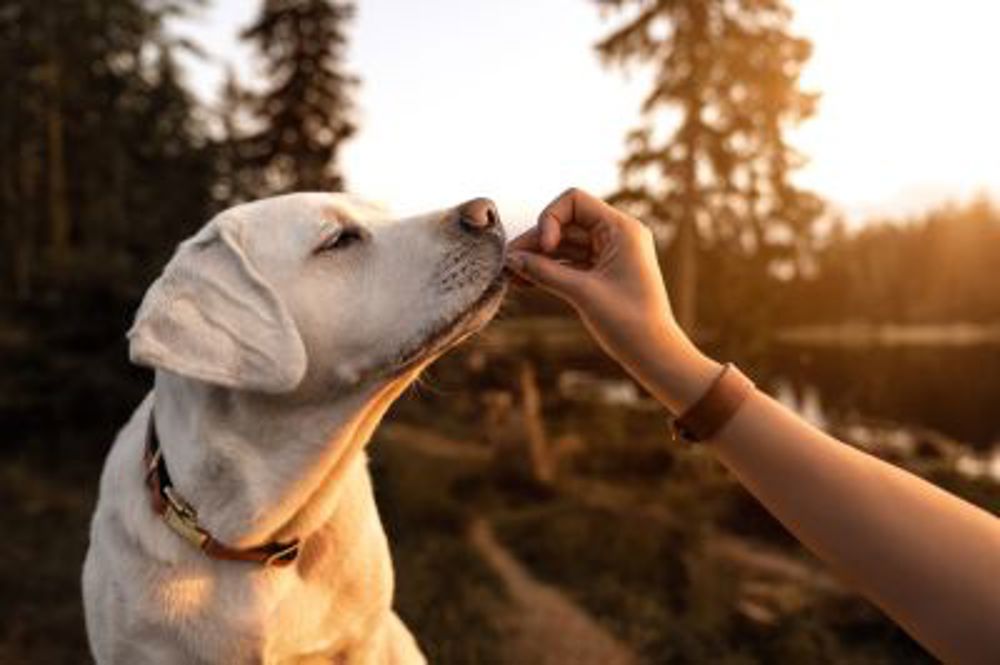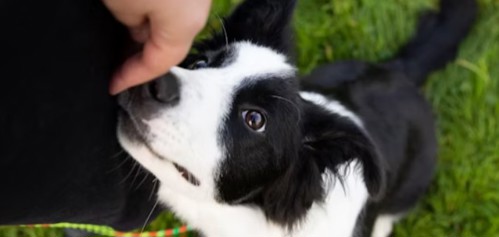
If your dog’s always hungry, you’ll be well aware of how difficult it can be to keep refusing them snacks, especially when they pull out their secret weapon – those large puppy dog eyes! But is every dog like this, or is it just yours who melts hearts for a morsel or torments you for a tasty treat? Every dog is different, which means that there are many complex reasons why some dogs are forever famished. Let’s delve into the reasons why your dog may always want food and what you can do to help them.
Should I be worried if my dog is always hungry?
Some dogs are fussy eaters, while others seem to be a bottomless pit on legs. Apart from bothersome begging for food, is having a hungry dog a problem?
Well, potentially, yes!
If you always give in to your dog’s request for food then their daily intake of calories increases, along with their waistline. Overweight dogs are more likely to suffer from other health complications, which can shorten their lifespan too. Understanding if and why your dog is hungry is really important, not only to make sure that they’re getting the right type and amount of food but to rule out any underlying health issues.
Why is my dog always hungry?
Dogs can be hungry because: it’s genetic, they’ve exercised a lot, they have health issues (such as diabetes or worms), it’s a side-effect of medication, they’re stressed, they’re bored or because they’re not getting enough of the right type of food. It can also be a learned behaviour, so they’re not in fact truly hungry at all. If you’re concerned about your dog’s appetite, always talk to your vet.
The best lifetime dog insurance
Protect your dog with the UK's Number 1 pet insurer, with up to £25,000 cover for vet fees.
Stress and boredom
Sometimes, dogs that don’t get enough mental stimulation may become food-focused. Providing your dog with more mental stimulation and physical exercise could help to stop them from being so snack-orientated. Try giving them puzzle feeders, playing obedience games with them or taking them for longer or more stimulating walks.
Their personality
Some dogs only eat what they need, while others will eat all that is given to them, and then some! Each dog is a complex mix of genetics and learned behaviours and some dogs are just more food-focused than others.
Genetics
Although any dog can become overweight, research has found that some dogs from certain breeds may be more prone to being overweight and hungrier than others, suggesting a possible genetic component.
Breeds said to be predisposed include:
About one in four Labradors, for example, carries a variant of a gene called POMC which affects how their brain perceives hunger and fullness after a meal.* Although some dogs in these breeds may have genes linked to obesity, it doesn’t mean that all dogs in these breeds are more susceptible.
Exercise
How active your dog is plays a big part in how many calories they need, which in turn determines how hungry they are. It’s important that your dog gets enough exercise so that they can burn up the calories they eat during the day. Similarly, it’s just as important that your dog gets enough food to replace the energy they’ve burnt.
Medications
Certain medications, such as prednisone, can cause dogs to have an increased appetite. For some medicines, these effects can gradually improve over time, as your dog gets used to it. These effects should stop after your dog stops taking the drug but talk to your vet if you’re concerned about any effects from your dog’s medication.
Habit
It’s easy for certain habits to creep into your daily life, like giving your dog treats whenever they show their ‘sad eyes’ face. But dogs are smart, and they’ve learnt that pulling on your heartstrings can get them a tasty snack. When your dog asks for food, they may not even be hungry but may be doing it out of habit – and also don’t want to pass up the chance for a tasty treat.
Health concerns
Some dogs may eat because they’re bored or because they have large appetites, but sometimes certain health conditions could make your dog hungrier. These include:
- Diabetes
- Cushing’s disease
- Thyroid problems
- Certain cancers
- Parasites
- Certain gastrointestinal problems
- Problems with their pancreas
The amount of food you give them
It’s important to try to find the ‘Goldilocks zone’ of how much to feed your dog. Feeding them too much can lead to weight gain, while not feeding enough can lead to weight loss and a very hungry dog. How much you feed them depends on their:
- Age
- Neuter status
- Breed
- Level of activity
- How often you feed them
- The calorie content of the food
- Whether they need to lose or gain any weight
The type of food you give them
Typically, food that’s high in protein and fibre is good to help your pet feel fuller for longer. Combined with a lower fat content, this type of food can help keep weight down in pets prone to weight gain. Some working dogs will need more energy in their diet, which can be helped by providing more calories through fats. Your vet will be able to help you work out a diet that’s right for your dog.
When to speak to your vet
A trip to the vet is usually sparked by a change in a dog’s health or behaviour. If your dog has always been a hungry hound, then it might be worth mentioning it at their next vet check-up. If you notice a sudden change in your dog’s appetite, contact your vet. It’s especially important to contact your vet if their insatiable appetite is accompanied by other signs, such as:
- Changes in how thirsty they are
- Being sick or having an upset stomach
- Eating things that aren’t food
- Changes in their weight
Sudden changes to your dog’s feeding habits can also be caused by stress or anxiety. Take your dog to your vet as your first port of call but try speaking to an animal behaviourist if you think your dog is unhappy or if the vet has ruled out any illness.
Tips on dealing with a hungry dog
If your dog often begs for food or tries to hypnotise you with a ‘please feed me’ look, you could:
- Offer them some fresh water - sometimes quenching their thirst may distract them
- Take them for a walk, as this may help to take their mind off food
- Give them a healthy snack, such as carrot sticks or slices of apple. Alternatively, you could give them a small amount of kibble, but make sure if you give any treats these are taken into consideration when calculating your dog’s total calorie intake for the day. Remember that some healthy fruits that we eat, such as grapes, can be dangerous to dogs, so make sure the food you give them is suitable for dogs.
- Give them some attention, such as petting them or playing with them
- Give them small meals throughout the day to keep them feeling full
- Time your dog’s meal so that you feed them before you prepare your own meal or before you eat
- Try giving them their food in a puzzle feeder or any treats in a Kong to keep them mentally stimulated
- Make sure that everyone in the house is aware not to give in to begging for food
- It may be tough for your dog if you suddenly cut off their supply of treats, so try gradually reducing the amount you give
Find a vet near you
If you're looking for a vet practice near you, why not visit the Royal College of Veterinary Surgeons' Find a vet page.
Find a dog trainer or behaviourist
Our online register helps you find accredited dog training instructors and canine behaviourists who have proven specialist knowledge, skills and experience.Think your dog may be affected?
If you're worried about your dog's health, always contact your vet immediately!
We are not a veterinary organisation and so we can't give veterinary advice, but if you're worried about any of the issues raised in this article, please contact your local vet practice for further information

